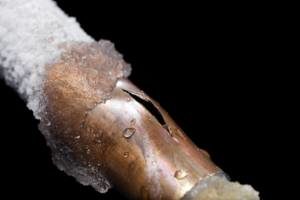What To Do When Your Pipes Freeze
 As cold as it can get in the Mid-Atlantic region, frozen pipes are always a possibility, especially when temperatures drop below 32 degrees overnight or for a sustained period.
As cold as it can get in the Mid-Atlantic region, frozen pipes are always a possibility, especially when temperatures drop below 32 degrees overnight or for a sustained period.
Should any of your pipes burst, it could mean costly damage to your home. For the best chance of avoiding damage, follow these tips for thawing a frozen pipe, what to do if a pipe bursts, and how to prevent frozen pipes in the first place.
Call Us at (877) 959-3534 for Plumbing Service
How To Thaw Frozen Pipes
There are signs you have frozen pipes. Look out for areas with frost accumulation or condensation and foul sewage smells from your sink. If you lose water during a period of extreme cold, frozen water supply lines are the culprit. Use the following tips to attempt to thaw the pipes:
- Shut off the main water line
- Open the faucets to prevent excessive pressure in the water lines
- Thaw the frozen pipes using a hair dryer or space heater aimed at the pipe, starting from the side nearest the faucets and moving toward the main shut-off valve
Be prepared to call an emergency plumber if the pipes do not thaw easily or begin to leak.
Call Us at (877) 959-3534 for Plumbing Service
What To Do if a Pipe Bursts
A burst pipe happens when the water freezes and expands, causing the pipe to split. This can result in large amounts of water spilling into your home, leading to significant water damage.
You need to act quickly if a pipe bursts, and you should shut off the main water supply valve as soon as possible. It is usually located near where the water line enters your home or just after the water meter. Turn the valve clockwise to shut off the flow of water.
After that, shut off the power if the electrical panel or any wiring is in danger of getting wet, and move any belongings near the burst pipe.
You’ll need to call an emergency plumber for pipe repair or replacement, so the sooner you call, the better.
How To Prevent Frozen Pipes
A little preparation can go a long way toward preventing frozen pipes. At the beginning of winter or before the weather report calls for a deep freeze, follow these steps to get your plumbing system prepared for the cold:
- Disconnect garden hoses and drain exterior hose bibs.
- Drain the irrigation system and blow it out with compressed air.
- Disconnect any pool heater or supply lines and drain them.
- Install pipe insulation on any pipes that are exposed to the cold, such as those in crawl spaces, unfinished basements, garages, or attics.
- Add heat tape to any pipes exposed to the outdoors or extreme cold.
- Keep your thermostat at a minimum of 55 degrees.
- Let your faucet drip and leave sink cabinets open during overnight freezes.
- Consider upgrading your home’s insulation if you’ve had frozen pipes before.
Call Us at (877) 959-3534 for Plumbing Service
This post first appeared on https://lentheplumber.com